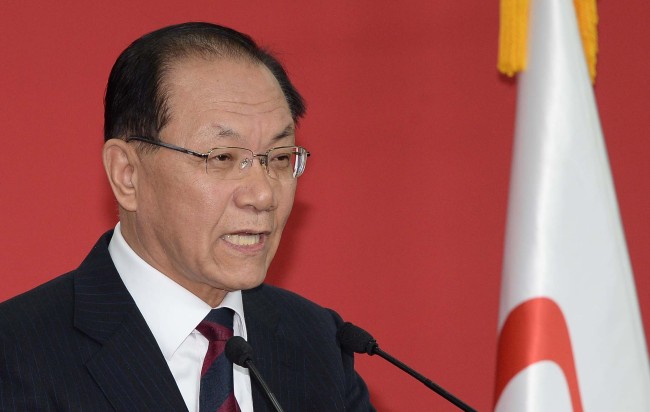
Saenuri Party chairman Rep. Hwang Woo-yea speaks at his New Year press conference at the party headquarters in Yeouido, Seoul, Tuesday. (Lee Gil-dong/The Korea Herald)
Ruling Saenuri Party chairman Rep. Hwang Woo-yea on Tuesday warned the opposition parties of forming alliances for the upcoming elections, calling such moves “forbidden fruit.”
“An alliance formed solely for an election is forbidden fruit. It is the public that feels the aftereffects of an election alliance,” Hwang said while voicing his concerns over the rise of independent Rep. Ahn Cheol-soo’s new party. Although Ahn’s plans are still in the works, opinion polls place the still-immaterial party far ahead of the main opposition Democratic Party. As for the steps his party would take in response to Ahn’s rise, Hwang declined to elaborate. He said only that the established parties should be shamed by support given to the new party.
“I want to issue a warning. Each party should go through the elections independently, and the parties should form alliances on policy issues as necessary.”
Forming alliances is a common tactic employed by opposition parties in elections in order to avoid dividing the progressive voters. The most recent case was seen during the 2012 general elections when the DP teamed up with the much smaller Unified Progressive Party.
The DP has since been blamed for aiding UPP lawmakers, including Rep. Lee Seok-ki who is on trial for plotting a revolt, in entering the parliament. Following Lee’s arrest in September, the government requested the Constitutional Court to review plans for disbanding the minor opposition party.
Hwang also suggested introducing an open primary system, saying that concerns surrounding the candidate system need to be resolved even if its abolishment is prevented by the Constitution.
The nomination system has been criticized for being open to corruption, and its abolishment was included in both the DP and Saenuri Party’s political reform plans.
“I strongly suggest that the ruling and opposition parties work together in legislating for open primaries,” Hwang said.
“By doing this, the adverse effects of candidate nomination, which has been seen as National Assembly members’ vested rights, will end.”
In an open primary system, the general public can cast their votes in a party’s primaries regardless of membership.
The opposition parties, however, met Hwang’s alternative to abolishing the nomination system with strong criticism.
“It is a sudden suggestion, which is a tactic to overturn (President Park Geun-hye’s) election pledge and a ploy to water down the issue,” DP spokesman Park Yong-jin said.
Park added that the ruling party should not start a new argument between the parties, saying it would be better to simply declare the related pledges have been scrapped.
Aside from election-related issues, Hwang focused on the economy, saying that the ruling party will support the government’s efforts at economic innovation.
As part of the efforts, the party will establish the “economic innovation committee” that will oversee issues regarding reform of state-run companies and economic regulations.
Innovation was also on Hwang’s agenda just as it was on that of his DP counterpart Rep, Kim Han-gil. Unlike Kim, whose focus was on political innovation, Hwang declared that 2014 will mark the beginning of the “innovation of provincial governments.”
According to Hwang’s vision, a special parliamentary committee focused on improving provincial governance will be established to add the National Assembly’s weight to the government’s efforts on related issues.
By Choi He-suk (
cheesuk@heraldcorp.com)






